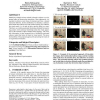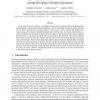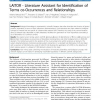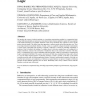629 search results - page 110 / 126 » Reasoning About Knowledge of Unawareness |
ICMI
2010
Springer
13 years 5 months ago
2010
Springer
Identifying verbally and non-verbally referred-to objects is an important aspect of human-robot interaction. Most importantly, it is essential to achieve a joint focus of attentio...
DIMVA
2011
12 years 11 months ago
2011
Many software security solutions—including malware analyzers, information flow tracking systems, auditing utilities, and host-based intrusion detectors—rely on knowledge of s...
BMCBI
2010
13 years 7 months ago
2010
Background: Biological knowledge is represented in scientific literature that often describes the function of genes/ proteins (bioentities) in terms of their interactions (biointe...
LOGCOM
2000
13 years 7 months ago
2000
We introduce the concept of reflection principle as a knowledge representation paradigm in a computational logic setting. Reflection principles are expressed as certain kinds of l...
MICRO
2008
IEEE
14 years 2 months ago
2008
IEEE
Any architectural optimization aims at satisfying the end user. However, modern architectures execute with little to no knowledge about the individual user. If architectures could...




